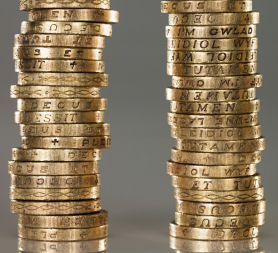Higher-rate tax to affect 750,000 extra people
 Siobhan Kennedy
Washington Correspondent
Siobhan Kennedy
Washington Correspondent
Three-quarters of a million more people will pay higher rate tax from April according to a new study. One tax expert tells Channel 4 News this trend could be set to continue.

The threshold at which higher rate tax kicks in will be reduced from £37,400 to £35,001 from April 5.
The Institute for Fiscal Studies (IFS) estimates around 750,000 extra people will have to start paying higher rate tax.
But 500,000 people will be lifted out of paying income tax altogether, as a result of the £1,000 increase in the personal allowance – the amount people can earn tax-free.
The personal allowance is being raised to £7,475.
The IFS says that the average household will be £200 a year worse off as a result of the tax increases and benefit cuts.
The Government is also increasing the main rate at which National Insurance is charged from 11 per cent to 12 per cent from the start of the new tax year.
People will also be charged 2 per cent not 1 per cent on earnings above £42,484.
James Browne, a senior research economist at the IFS, said: “Further reductions in household income are inevitable as Government policies aimed at helping to reduce Government borrowing from its post-Second World War high are introduced.
“The set of the changes coming in April is complex and the pattern of gains and losses reflects this.”
A continuing trend?
The higher rate threshold has been reduced to stop people on higher salaries benefiting from the increased personal allowance.
The Government has committed itself to raising the personal allowance to £10,000.
“This is hitting people who would not consider themselves well off.” Mike Warburton, Grant Thornton
James Browne said: “We calculate that a further 850,000 would be brought into this higher rate bracket by 2014-15 if the Government reaches its ambition of a £10,000 allowance in the same way.”
Mike Warburton is a director at Grant Thornton and a specialist on tax issues.
He told Channel 4 News the Government had to reduce the deficit and people on middle incomes would inevitably be affected: “This is hitting people who would not consider themselves well off.
“They’re on above average incomes – people in middle management, teachers, higher ranking police officers – but we’re not talking about wealthy bankers here.
Mr Warburton continued: “My fear is that this is the start of a process which will continue.
“I think the Government is right to raise the personal allowance and I can see why they don’t want wealthier people to benefit.
“But my guess is we will see a continuation of this process although the Treasury disputes that.”
High earners
The changes are bad news for households, with many families already struggling in the face of high inflation and stagnant earnings growth.
The IFS said the reforms would hit higher income households the hardest, with some people in this group also likely to be affected by the new restrictions on how much can be paid into a pension tax-free each year.
It estimates that the richest 10 per cent of people will lose 3 per cent of their net income from April 6, compared with a 1 per cent loss for the population as a whole.
Those with the highest incomes have already been hit by the new 50 per cent tax rate for people earning more than £150,000 and the loss of the personal tax allowance for those on more than £100,000.
At the other end of the spectrum, people reliant on means-tested benefits will see their incomes hit by the Government’s decision to increase payments in line with inflation as measured by the Consumer Prices Index (CPI), rather than the Retail Prices Index (RPI), which tends to be higher.
CPI was running at 3.1 per cent in September, the month that benefit increases are based on, while RPI was considerably higher at 4.8 per cent.